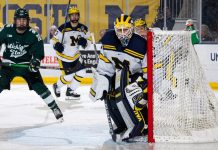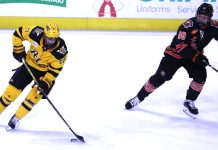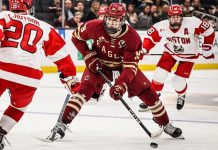It was no secret that Dartmouth was the team to beat in ECAC Hockey in mid-November. The Big Green started 5-0-1 and were 7-2-2 at the holiday break.
Since then, Bob Gaudet’s guys are 4-6-1 and struggling — on the whole — to score goals. Not what you’d expect from a team led by juniors Eric Robinson, Matt Lindblad and sophomore Tyler Sikura, who have combined for 28 goals in 22 games.
“We got some guys banged up, but that’s just part of the business. We fight through that,” Gaudet said. “A lot of young guys actually look like veteran players now, but we’ve had to fight through things.”
The coach placed no fault at the feet of the players, saying: “I really enjoy working with this group. They work their tails off every single day.”
What is lacking, as often as not, is consistency. Coaches’ favorite four-syllable word is still a work in progress in Hanover, where a senior class of four has combined for 45 appearances this year. The way Gaudet sees it, what is lacking isn’t necessarily consistency of effort or focus, but style.
“What I want is for everyone to look the same, to play the same way,” he said. “We have guys like Sikura and Lindblad, but the things that they do to set up opportunities to score — and the way that they work — I want that to be the same throughout our lineup. It might not be quite the same level of skill or experience … but Sikura’s a sophomore, Lindblad’s a junior, so it’s not like they’re seniors.
“What I’m expecting is that we’ll have interchangeable parts. It may not appear that way to everybody when you lose a key player, but that’s what I as a hockey coach, that’s what I want. I want guys to look the same on the ice, to play the same.”
One facet of the game that appears to be in good shape is between the pipes, where junior Cab Morris has posted a .921 save percentage and allowed barely two goals a game (2.05) in 14 appearances.
“He’s maturing as a goaltender — you can see it in the way that he plays and his confidence,” Gaudet said. “He doesn’t expend a lot of energy, he’s very calm in the net, he’s making key first saves and stealing the odd rebound that we might mess up in front of him. He’s been a good leader and a really good role model, I think, for the two young goalies. [Freshman] Charles Grant has done a good job for us, and our other guy, James Kruger, is going to be a really, really good goalie as well.”
One of the most baffling pieces in Dartmouth’s puzzle is the squad’s wildly disparate records at home versus away: The team that boasts a 9-2 record at Thompson Arena has muddled to a lackluster 2-6-2 mark when donning the road greens.
“It’s hard to pinpoint exactly what the differences are. I think we’ve played really solid hockey on the road, but we just haven’t got the results. At home, we’ve played really solid hockey and gotten results, and I don’t really know what the difference is, honestly,” Gaudet said. “I do know it’s just a matter of time, if we continue to play as hard as we’re playing, that we win a big road game. We’re right there, and it’s literally — at this level — a bounce of the puck, or a timely play, or a power-play goal or a big save. That’s the difference between a W and an L; there’s not much more.”
RPI’s two-and-a-half-month march
What’s the distance between “disgusting” and “good” these days?
About 18 games, give or take. That’s how long Rensselaer coach Seth Appert said it has taken to get the Engineers to get to where they are now: competitive and dangerous.
“We’re making some good strides,” he said. “We’re on I guess what we’re calling a two-and-a-half-month march toward being a good hockey team, and we’ve been playing real well — consistently — for about two-and-a-half months. Not always getting results, but getting there.”
The coach isn’t exactly kicking back and riding the momentum of a weekend sweep, though. This is not that kind of team, and this is not that kind of coach.
“I think we’re pretty good right now. I don’t think we’re really good, not quite a great team, but we’re making good strides,” he said. “We’ve had a lot higher level of commitment, day-to-day in practice, to doing things the right way, and that translates to games. Against Quinnipiac [on Dec. 1] we lost 3-1, we outplayed them and gave up a short-handed, five-on-three goal to lose the game late in the third. I just remember saying, playing the right way on Friday or Saturday night doesn’t guarantee anything, but playing the right way over 25 or 30 games, you’re going to win a lot of hockey games.”
February’s Engineers bear little resemblance to November’s, which bottomed out with twin 4-0 losses at Dartmouth and Harvard.
“In feel, those were disgusting,” the coach recalled of his team’s efforts.
This week, however, saw the Engineers flip the script with a pair of 3-0 victories over — wait for it — Harvard and Dartmouth.
“These were solid games, but we weren’t great. We weren’t great this weekend. Quite frankly, we might have been better last weekend against Union [in a 3-2 loss],” Appert said. “We were good this weekend, though: We played hard, we played physical, we defended very well, especially in the first 90, 95 minutes of the weekend.”
RPI knows that in order to be a contender, it has to play positively shutdown defense. Much like last year, the 2012-13 Engineers are not built to outgun their foes, so they’ve had to commit to a much more disciplined style of play.
“We’re doing a good job of making it difficult for our opponents to generate a dramatic amount of offense, and that’s very important for us, because we don’t generate a dramatic amount of goals,” Appert said. “We create enough offense, but it’s a fight for us to get to three every night.”
Fortunately for them, the Engineers have developed a pretty decent goaltender to anchor the defense. Rookie Jason Kasdorf boasts a tremendous .944 save percentage and 1.44 goals against average in 12 appearances; it’s no wonder Winnipeg drafted him.
“He’s given us a little belief and swagger, so I think we’re playing a lot better team defense in front than we were in October or November,” Appert said. Earlier in the season, “he was over his head in practice, his habits weren’t very good, he wasn’t strong enough, all those things, and he was getting beat up a lot. But I’ll tell you what, the young man works very hard and he doesn’t question a lot of things. He’s one of those guys that you coach and tell him to do something, and he does it.”
One thing neither Kasdorf nor his coach nor his teammates are doing is scoreboard-watching. Knotted up in a massive five-way tie for sixth, RPI nonetheless has no time or energy to worry about the rest of the league.
“I could care less,” Appert said. “I told our team that today, too. We have a standings board in the locker room and it’s updated, so we’re not naive to the situation … but we’ve been really committed as a team and really committed to the process, to not be consumed by wins and losses and standings and where we sit. That’s led to us becoming a better hockey team.
“So now that we’ve actually gotten ourselves in a position to not cringe when you look at the board, that doesn’t mean it’s time to start looking at the board. We just need to stay focused on what’s been giving us some level of success over the last two months. We can’t be a finished product on Feb. 4.”
Knights are off the mat
There are two big truths about the 2012-13 Clarkson season: One, there have been a lot of injuries; and, two, the Golden Knights did not respond well to them.
“We didn’t handle injuries very well at the start of the year, and there’s no excuse for that. It was something that set us back,” coach Casey Jones said.
Injuries stole man-games from top threats like sophomore and leading goal-scorer Joe Zarbo (12 goals, four games missed), junior and captain Ben Sexton (nine games missed) and senior Adam Pawlick (10 games missed). The brutal bug also bit the defense, costing senior Andrew Himelson three games, and sophomore Sam Lebrecque eight.
About Sexton, Jones said, “being out for six, seven weeks at a time where you can’t do much, it takes off all the hard work he did in the offseason and he almost has to start from scratch. He’ll be an important cog for us down the stretch, but we’ve limited his minutes and how much we can use him because when you have those injuries it just puts you on the shelf for your cardio [fitness], puts you in a position where you can’t do much to maintain your conditioning. It’s been an unfortunate circumstance for him, but he’s mentally tough, he’ll fight through it and we’ll try to get him back in peak performance down the stretch here where it matters the most for us.”
The coach probably could have said the same about nearly a half-dozen other players, too. But Clarkson seems to be rounding back into health at the right time and the results are finally coming in the form of a modest 2-1-2 stretch following a dismal 0-5 slump straddling the holiday break.
Zarbo is putting together a fine season despite his games lost, piling up 16 points in 22 games and leading a power play that is approaching 20 percent effectiveness in league play.
“Joe’s got a really pure stick in terms of scoring,” Jones said. “He’s someone that’s caught fire, his confidence has really come about, and that has a lot to do with the fact that he’s rounded his game out in a lot of aspects.”
Someone else who has made great strides this year has been the surprising rookie netminder Greg Lewis. With 24 appearances and nearly 1,400 minutes played already, Lewis is handling a veteran workload admirably, if not extraordinarily (.903 save percentage, 2.83 goals against average).
“We had to watch him a little bit in terms of how much he does during the week; that’s a lot to put on a freshman. He deserves the minutes, and it’s the college game — you don’t play an overabundance of games, so a lot of times you can ride someone for a longer period — but for a freshman it’s a little more mentally grueling, just trying to get used to the landscape and all that,” Jones said. “But he’s been good, he’s mentally tough, and he’ll have to be good for us down the stretch in order for us to be successful.”
That’s especially true given the Knights’ pervasive problems on the penalty kill. At only 77 percent effectiveness overall, the PK is even worse — 74 percent — in conference play. Clarkson has surrendered at least one power-play goal in seven of its nine games in 2013.
“For a while there, we thought we’d turned a corner, but it’s been one of those situations: I really don’t think we’ve been aggressive enough on it,” Jones said. “It’s a situation where … you’re on the minus side of the ledger on special teams — it’s tough enough to score five-on-five in college hockey now — if you have to outscore teams by two just to end up at square one, it puts you in a hole. I thought up until last weekend we had made real progress.”
Colgate went 2-for-4 on the advantage in Friday’s 4-4 draw, and Cornell went 1-for-6 in Saturday’s 6-3 Clarkson win.
In any case, the three points kept Clarkson even with RPI and the rest of the 13-pointers, adding to the five-team pileup for sixth place. Jones, for one, seems to enjoy the traffic jam a bit.
“We’re looking at it as a positive,” he said. “The games are meaningful for us but it is really tight. The swing you can have in one weekend is unbelievable right now.”
The Knights have a chance to untangle themselves from the mess this weekend, as third-place Union and RPI check into Cheel Arena.


